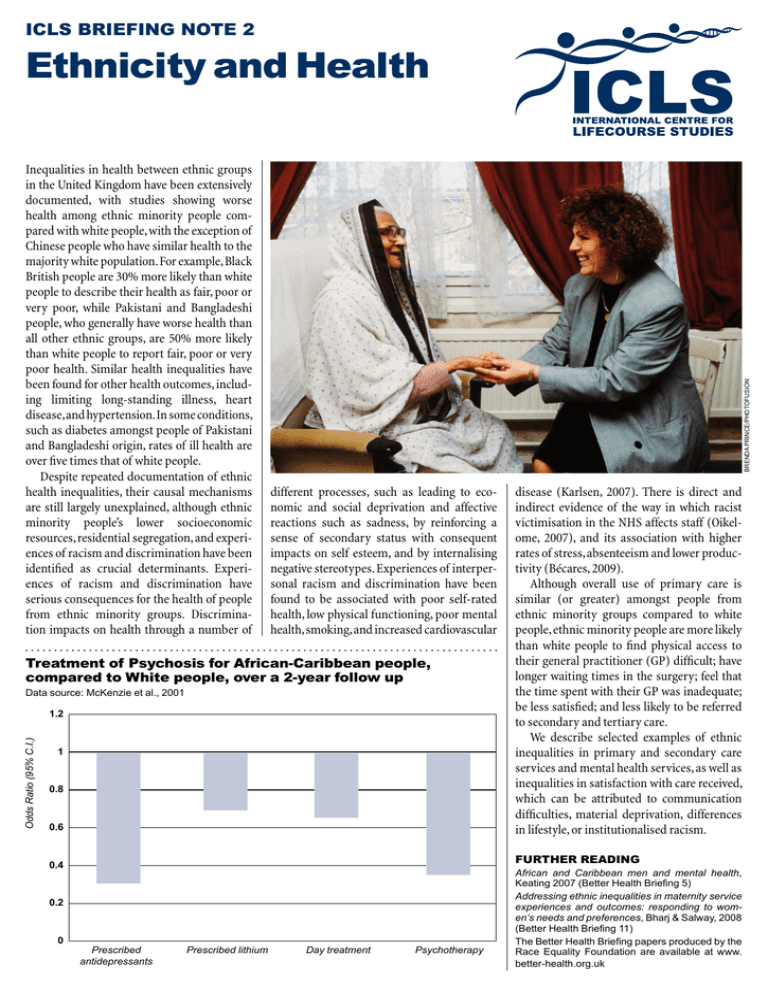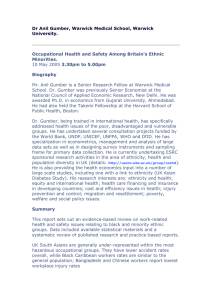Ethnicity and Health ICLS BRIEFING NOTE 2
advertisement

ICLS BRIEFING NOTE 2 Inequalities in health between ethnic groups in the United Kingdom have been extensively documented, with studies showing worse health among ethnic minority people compared with white people, with the exception of Chinese people who have similar health to the majority white population. For example, Black British people are 30% more likely than white people to describe their health as fair, poor or very poor, while Pakistani and Bangladeshi people, who generally have worse health than all other ethnic groups, are 50% more likely than white people to report fair, poor or very poor health. Similar health inequalities have been found for other health outcomes, including limiting long-standing illness, heart disease, and hypertension. In some conditions, such as diabetes amongst people of Pakistani and Bangladeshi origin, rates of ill health are over five times that of white people. Despite repeated documentation of ethnic health inequalities, their causal mechanisms are still largely unexplained, although ethnic minority people’s lower socioeconomic resources, residential segregation, and experiences of racism and discrimination have been identified as crucial determinants. Experiences of racism and discrimination have serious consequences for the health of people from ethnic minority groups. Discrimination impacts on health through a number of BRENDA PRINCE/PHOTOFUSION Ethnicity and Health different processes, such as leading to economic and social deprivation and affective reactions such as sadness, by reinforcing a sense of secondary status with consequent impacts on self esteem, and by internalising negative stereotypes. Experiences of inter­per­ sonal racism and discrimination have been found to be associated with poor self-rated health, low physical functioning, poor mental health, smoking, and increased cardio­vascular Treatment of Psychosis for African-Caribbean people, compared to White people, over a 2-year follow up Data source: McKenzie et al., 2001 Odds Ratio (95% C.I.) 1.2 1 0.8 0.6 Further reading 0.4 0.2 0 disease (Karlsen, 2007). There is direct and indirect evidence of the way in which racist victimisation in the NHS affects staff (Oikelome, 2007), and its association with higher rates of stress, absenteeism and lower productivity (Bécares, 2009). Although overall use of primary care is similar (or greater) amongst people from ethnic minority groups compared to white people, ethnic minority people are more likely than white people to find physical access to their general practitioner (GP) difficult; have longer waiting times in the surgery; feel that the time spent with their GP was inadequate; be less satisfied; and less likely to be referred to secondary and tertiary care. We describe selected examples of ethnic inequalities in primary and secondary care services and mental health services, as well as inequalities in satisfaction with care received, which can be attributed to communication difficulties, material deprivation, differences in lifestyle, or institutionalised racism. Prescribed antidepressants Prescribed lithium Day treatment Psychotherapy African and Caribbean men and mental health, Keating 2007 (Better Health Briefing 5) Addressing ethnic inequalities in maternity service experiences and outcomes: responding to women’s needs and preferences, Bharj & Salway, 2008 (Better Health Briefing 11) The Better Health Briefing papers produced by the Race Equality Foundation are available at www. better-health.org.uk ICLS BRIEFING NOTE 2 Ethnicity and Health Study 1 Primary and secondary care services A recent national survey reported no evidence of ethnic inequalities in accessing primary care services, or in clinical outcomes of care for hypertension, raised cholesterol and diabetes. However, ethnic inequalities were found for access to hospital services and dental services (Nazroo et al., 2009). Ethnic differences in access to some forms of antenatal care have also been reported (Bharj and Salway, 2008). Previous studies have found inequities in treatment provided by the NHS. For example, findings of the Acute Inpatient Survey (2001/02) showed that ethnic minority people were less likely, when compared to white people, to be admitted to a ward within two hours, and to agree that they had been given enough notice of the admission date. Ethnic minority people were also more likely to report their admission date had been changed at least once by the hospital, and to share a room or ward with patients of the opposite sex (Department of Health, 2004). South Asian people have been found to be less likely to be prescribed medication for coronary heart disease (Ward et al., 2004) and more likely to refuse and drop out of cardiac rehabilitation programmes (Tod et al., 2001). Study 2 Mental health services Black African and Black Caribbean men have been found to be over-represented in mental health services and more likely to be held under a section of the Mental Health Act. For example, recent figures show that over 54% of Black people in inpatient mental health units are compulsorily detained under the Mental Health Act, compared with 32% generally (NHS Information Office 2009). African-Caribbean people are also more likely to receive medication for mental health problems as the primary form of treatment (Department of Health, 2003) and less likely to receive psycho­ therapy (McKenzie et al., 2001). The role of racism in the generation of these inequalities is complex and multifaceted (Keating, 2007). Study 3 Satisfaction with Care A recent report commissioned by the Department of Health examined data from the National Patient Survey and found that for the most part, ethnic minority people were less likely than white people to report a positive experience across different NHS settings. Ethnic minority patients who had had a recent outpatient appointment at an acute hospital reported dissatisfaction with access and waiting times. They also reported dissatisfaction with items such as having confidence and trust in the doctor, having better information and building closer relationships with staff. Ethnic minority people who had recently attended an accident and emergency department were also less likely than white people to report satisfaction with access and waiting times. They were also less positive about receiving safe, high quality care than white patients, and more likely to say that staff talked about them, as if they weren’t there (Department of Health & Healthcare Commission, 2008). in Mental Health Care. However, these frameworks focus only on mental health, isolating other aspects of health services which are also problematic, and they run the risk of excluding white minority groups such as the Irish (Bhui, McKenzie & Gill, 2004). Both focus on strategic and organisational change: identifying ethnic monitoring, appropriate and responsive services, and community engagement as the key elements for service improvements. Concern has been raised about the emphasis placed on race as a focus of reform, particularly in the DRE report: some because it is considered insufficient; others because it is felt to encourage outdated race based solutions instead of acknowledging people’s different cultural needs. In addition, the problem seems to have been framed in the context of culture; with a focus on developing a culturally competent workforce (Keating, 2007). Considering cultural competence as the most appropriate response to meeting the needs of ethnic minority communities can lead to a narrow focus on aspects such as dietary requirements, and religious and spiritual practices. Although these factors are important, focussing mainly on them may mean that the institutional processes and practices that discriminate against ethnic minority communities are over-looked (Keating 2007). The challenge for policy makers therefore lies in tackling institutional and individually mediated racism and finding ways of responding to the needs of ethnic minority people in ways that value diversity. Study 4 Policy Initiatives Racism, cultural ignorance and stigma are significant barriers to the engagement of ethnic minority communities within healthcare settings (Latif, 2010). Developing understanding of and sensitivity towards the concerns of ethnic minority communities as well as a culturally competent workforce to support them is of critical importance. Creating opportunities for the victims of racism within the NHS to report and respond to their experiences is also crucial. The Department of Health has implemented two policy frameworks aimed at tackling ethnic inequalities in access to mental health services: Inside Outside: Improving mental health services for black and minority ethnic communities in England, and Delivering Race Equality (DRE) This Briefing Note (BN2) is part of the International Centre for Lifecourse Studies in Society & Health (ICLS) Briefing Notes Series. It has been produced in order to assist policy making, primarily in the UK. Findings presented in the ICLS Briefing Notes are relevant to government, private and third sector organizations. For more information please contact the authors Laia Becares, Caroline Coope,Yvonne Kelly and Saffron Karlsen E: icls@public-health.ucl.ac.uk . ICLS wishes to thank the Race Equality Foundation for their contribution to this BN. ICLS is funded by the UK Economic and Social Research Council (ESRC) RES-596-28-0001. © ICLS, 2010 www.ucl.ac.uk/icls




